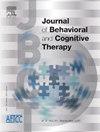苯二氮卓依赖性问卷 (BDEPQ):简短版本的开发和法文改编版的验证
IF 1.6
Q3 PSYCHIATRY
引用次数: 0
摘要
背景苯二氮卓类药物(BZDs)是治疗焦虑症和失眠症最广泛使用的药物。虽然对短期治疗方案有效,但在长期治疗方案中,应谨慎考虑其风险与收益的权衡。与酒精类似,这类药物作用于 GABA 系统,已知会导致快速耐受、(有时是强烈的)戒断综合征和快速依赖。长期服用会加重睡眠障碍和焦虑,并增加事故风险。法国人和瑞士人都是 BZDs 的大量使用者。据估计,2%-5% 的成年人服用 BZDs 的时间超过了建议的时间。本研究的主要目的是对包含 30 个项目的原始苯二氮卓类药物依赖性问卷(BDEPQ)以及本研究开发的包含 11 个项目的简略版本(BDEPQ-11)(专门针对睡眠使用)进行实证评估。由于删节版的长度实用、效率高,而且同样不需要购买许可证,因此在临床应用和研究中具有很高的价值,并符合公共卫生的利益。方法量表的调整过程遵循 Guillemin 等人(1993 年)制定的重要规范:翻译、回译、委员会审查和预试。为了评估量表改编的收敛效度和发散效度,我们招募了至少 12 个月以来一直服用 BZDs 的 531 名参与者作为大样本,他们对问卷以及其他量表进行了回答。此外,我们还提供了一部分样本(n = 165)的 BZD 依赖症临床诊断结果,通过这些诊断结果,我们还可以评估量表在区分严重依赖症方面的可区分性。这两个版本与其他量表的收敛效度和发散效度也显示出适当的结果。然而,在探索性因子分析规范和与专业人员临床诊断的对应性方面,只有简明版表现出色,尤其是其量化 BZD 药物耐受性和滥用的分量表。讨论法语是超过 25 个国家的官方语言,这一改编版的推出满足了有关 BZD 依赖性的日益增长的临床和研究需求,也为重要的跨文化研究提供了依据。在英语和法语中,除了 BDEPQ 之外,很少有关于 BZD 依赖性的量表可供从业人员免费使用。未来的研究可能会考虑创新一个现代化的全长版本,该版本应以当今可用的统计分析为基础,例如当前工作中所使用的统计分析。本文章由计算机程序翻译,如有差异,请以英文原文为准。
The Benzodiazepine Dependence Questionnaire (BDEPQ): Development of a brief version and validation of a French adaptation
Context
Benzodiazepines (BZDs) are the most widely-used pharmaceutical treatment for anxiety and insomnia. While effective for short term protocols, their risk–benefit tradeoff for long-term protocols should be considered with caution. Similar to alcohol, these substances act on the GABA system, and are known to result in rapid tolerance, (sometimes intense) withdrawal syndromes, and fast dependence. Long-term consumption aggravates sleep disorders and anxiety, and increases the risk of accidents. Both the French and the Swiss are high users of BZDs. It is estimated that between 2–5% of adults take them for longer than recommended. Commercialized since the 1970s, there is still no freely available French-language questionnaire assessing dependence.
Aim/Purpose
The principal objective of this study was to empirically assess the original Benzodiazepine Dependence Questionnaire (BDEPQ) of 30 items, as well as a herein developed abridged version of 11 items, the BDEPQ-11 specific to sleep use. As the abridged version is of practical length, was found efficient, and likewise does not require the purchase of a license, it is appreciable for clinical applications and research, and serves the interest of public health. These two scales were empirically assessed respective to their adaptation to the French language, currently observed as the 5th most-spoken language in the world.
Method
The process of scale adaptation followed the important norms established by Guillemin et al. (1993): translation, back-translation, committee review, and pre-testing. A large sample of n = 531 participants who have been taking BZDs since at least 12 months were recruited and responded to the questionnaire, along with other scales in order to assess the adaptation’s convergent and divergent validity. Clinical diagnoses of BZD dependence were also available for a subset of the sample, n = 165 by which discriminability of the scale for distinguishing severe dependance could also be assessed.
Result
Both the full-length and brief versions of the French-adapted BDEPQ satisfied the confirmatory factor analysis norms, and in which the brief version surpassed the original. The two versions also displayed appropriate convergent and divergent validity results with other scales. However, in regard to the exploratory factor analysis norms and correspondence with clinical diagnoses from professionals, only the brief version excelled, especially with regard to its subscale that quantifies BZD drug tolerance and misuse.
Discussion
French is an official language in more than 25 countries and the availability of this adaptation responds to a growing clinical and research need regarding BZD dependence, as well as for important cross-cultural research. In both English and French, few scales on BZD dependence apart from the BDEPQ are available and freely available to practitioners. Future research may consider innovating a modernized full-length version that is well-grounded in the statistical analyses available today, such as those that were utilized in the current work.
求助全文
通过发布文献求助,成功后即可免费获取论文全文。
去求助
来源期刊

Journal of Behavioral and Cognitive Therapy
Psychology-Clinical Psychology
CiteScore
3.30
自引率
0.00%
发文量
38
审稿时长
60 days
 求助内容:
求助内容: 应助结果提醒方式:
应助结果提醒方式:


